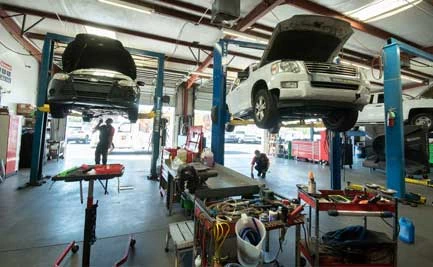All Categories
Featured
Normal engine tune-ups are important for preserving your lorry's performance, improving gas efficiency, and extending its lifespan. Whether you're a skilled car proprietor or a novice, understanding the essential aspects of an engine tune-up can help you keep your car running smoothly for years. Right here are some crucial ideas to assist you with the process.
- Adjustment the Flicker Plugs. Trigger plugs are tiny however magnificent components that play an important function in igniting the fuel-air blend in your engine. In time, they can wear or end up being fouled, resulting in poor engine performance, reduced fuel performance, and hard starts.
Throughout a tune-up, examine your stimulate plugs for wear and change them as necessary. For most vehicles, ignition system ought to be replaced every 30,000 to 100,000 miles, depending upon the kind and product. Fresh stimulate plugs guarantee reliable burning and smoother engine procedure.
- Evaluate and Change the Air Filter. The air filter is your engine's first line of defense against dirt, particles, and other contaminants. A stopped up or dirty air filter can restrict airflow, triggering your engine to work more challenging and eat even more fuel.
Inspect your air filter during a tune-up and change it if it's unclean or past its suggested solution interval. A clean air filter enhances engine performance and boosts fuel economic climate.
- Inspect the Gas System. Over time, your gas system can accumulate dirt and carbon deposits, lowering engine performance and gas effectiveness. Cleansing the gas injectors and gas lines during a tune-up aids preserve proper gas delivery and burning.
You can use a fuel system cleaner or have a specialist mechanic perform a much more extensive cleaning. This step is particularly advantageous for older lorries or cars and trucks frequently driven in stop-and-go website traffic.
- Examine the Belts and Pipes. Belts and hose pipes are important for numerous engine features, such as running the generator, water pump, and cooling. Throughout a tune-up, look for cracks, fraying, or signs of wear on these components.
Replace any worn-out belts and hoses to avoid potential break downs. A damaged belt or dripping hose can bring about engine overheating or loss of power, so dealing with these problems without delay is important.
- Change the Engine Oil and Oil Filter. Engine oil is crucial for lubricating moving components, reducing rubbing, and managing engine temperature level. Gradually, oil becomes polluted and loses its performance.
As component of a tune-up, replace the engine oil and oil filter. Use the kind of oil suggested by your lorry's manufacturer and stay with the recommended adjustment intervals. Tidy oil keeps your engine running efficiently and stops early wear.
- Check the Battery and Charging System. A healthy battery is important for starting your auto and powering its electric systems. Throughout a tune-up, inspect the battery's voltage and inspect the terminals for rust. Tidy the terminals if required and ensure a protected link.
Furthermore, examination the alternator and charging system to ensure your battery remains charged during operation. If your battery is weak or old, take into consideration changing it to avoid unexpected break downs.
- Flush and Re-fill the Coolant. The air conditioning system manages your engine's temperature level, preventing it from overheating. Old or contaminated coolant can shed its effectiveness, bring about prospective engine damages.
During a tune-up, purge the old coolant and replace it with a fresh mixture. Additionally, examine the radiator, thermostat, and pipes for leaks or damage. Maintaining the air conditioning system in good problem guarantees your engine runs at the best temperature level.

- Address Caution Lights and Unusual Symptoms. Modern cars are geared up with analysis systems that inform you to possible issues through control panel warning lights. If your check engine light or any type of various other warning indications get on, address them during your tune-up.
Furthermore, focus on uncommon signs and symptoms such as unusual noises, harsh idling, or reduced fuel effectiveness. An expert auto mechanic can identify and solve these troubles during the tune-up procedure.
- Do Not Neglect the Exhaust System. Your vehicle's exhaust system removes unsafe gases from the engine and ensures correct exhausts. Inspect the exhaust system for leaks, corrosion, or damages throughout a tune-up. A malfunctioning exhaust system can impact engine performance and bring about ecological and safety and security problems.
- Usage High-Quality Parts and Fluids. When changing parts or covering off fluids during a tune-up, always select high-quality items that fulfill your vehicle's specifications. Making use of poor parts or wrong fluids can negatively influence your engine's efficiency and long life.
Verdict: Normal Tune-Ups Are Trick to Engine Health And Wellness. Putting in the time to tune up your engine guarantees it operates successfully, conserves gas, and reduces the danger of failures. Whether you carry out these jobs on your own or rely upon a relied on auto mechanic, normal tune-ups are a financial investment in your car's dependability and long life. Follow these pointers, and you'll take pleasure in a smoother, a lot more dependable adventure for years to find.
Latest Posts
Discover Reduce Expenses on Car Maintenance with Montclare Auto Repair’s Limited-Time Deals
Explore Auto Services & More: Complete Auto Care Solutions from Montclare Auto Repair
Check Out Exceptional Auto Repair Care from Montclare Auto Repair – Quality Service Today
More
Latest Posts
Discover Reduce Expenses on Car Maintenance with Montclare Auto Repair’s Limited-Time Deals
Explore Auto Services & More: Complete Auto Care Solutions from Montclare Auto Repair
Check Out Exceptional Auto Repair Care from Montclare Auto Repair – Quality Service Today
